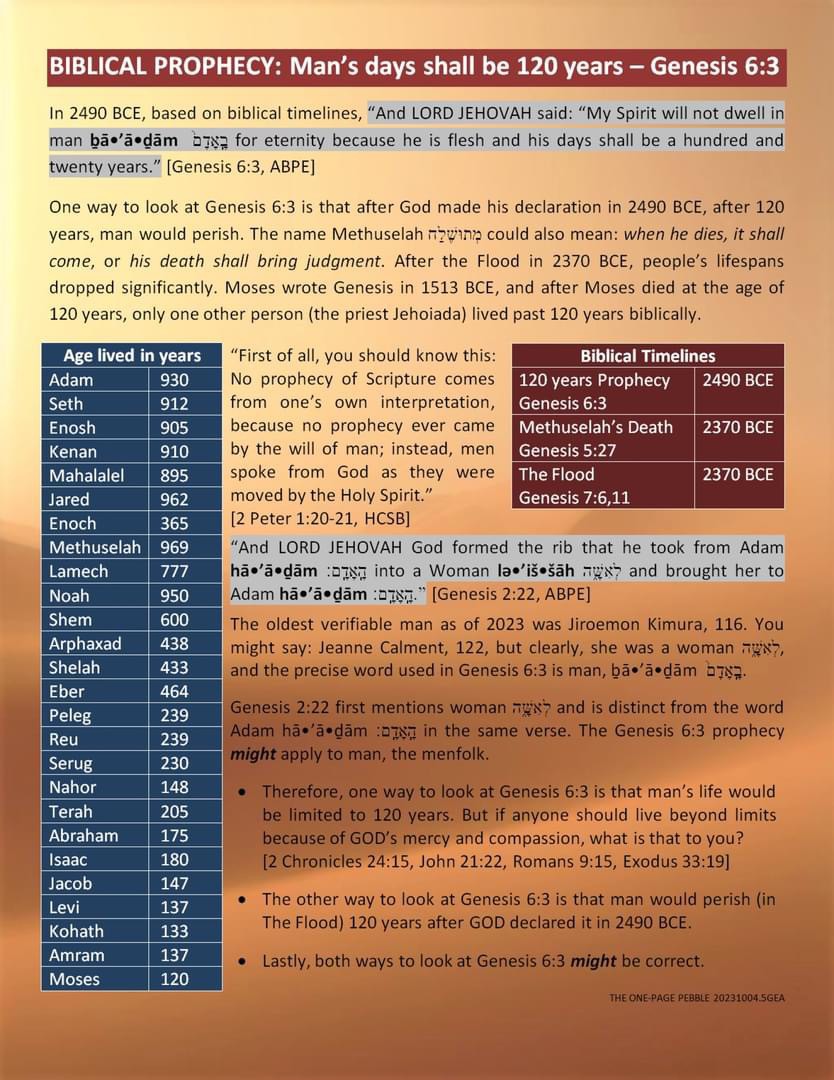Watch
Events
Articles
Market
More
'Give No Place to the Devil!'
First Fruits Ministries presents “Give No Place to the Devil!,” a Bible study presentation delivered on 10/31/2023 as a rebuke of the pagan festival called 'halloween' and a call on all Christians to reject this dark celebration and stand instead in the light of Messiah Yeshua. We ought to have no fellowship with the unfruitful works of darkness, but rather expose them, for the people of God are destroyed for lack of knowledge. As such, the study details various historical perspectives on the day and explains Biblically why followers of Messiah Yeshua cannot keep it.
Review the presentation recording:
YouTube:
Download the presentation slides:



I've been feeling very stressed lately and going on little sleep thank you brother David Martin for the comic relief.



Age lived in years
Adam
930
Seth
912
Enosh
905
Kenan
910
Mahalalel
895
Jared
962
Enoch
365
Methuselah
969
Lamech
777
Noah
950
Shem
600
Arphaxad
438
Shelah
433
Eber
464
Peleg
239
Reu
239
Serug
230
Nahor
148
Terah
205
Abraham
175
Isaac
180
Jacob
147
Levi
137
Kohath
133
Amram
137
Moses
120
Biblical Timelines
120 years Prophecy
Genesis 6:3
2490 BCE
Methuselah's Death
Genesis 5:27
2370 BCE
The Flood
Genesis 7:6,11
2370 BCE
BIBLICAL PROPHECY: Man's days shall be 120 years - Genesis 6:3
In 2490 BCE, based on biblical timelines, "And LORD JEHOVAH said: "My Spirit will not dwell in man bão'ã dam boss for eternity because he is flesh and his days shall be a hundred and twenty years." [Genesis 6:3, ABPE)
One way to look at Genesis 6:3 is that after God made his declaration in 2490 BCE, after 120 years, man would perish. The name Methuselah rzwing could also mean: when he dies, it shall come, or his death shall bring judgment. After the Flood in 2370 BCE, people's lifespans dropped significantly. Moses wrote Genesis in 1513 BCE, and after Moses died at the age of 120 years, only one other person (the priest Jehoiada) lived past 120 years biblically.
"First of all, you should know this:
No prophecy of Scripture comes from one's own interpretation, because no prophecy ever came by the will of man; instead, men spoke from God as they were moved by the Holy Spirit."
(2 Peter 1:20-21, HCSB]
"And LORD JEHOVAH God formed the rib that he took from Adam hã 'ã•dãm :any into a Woman lao'is•säh nuky and brought her to Adam hã•'ã•dãm :27%7." [Genesis 2:22, ABPE]
The oldest verifiable man as of 2023 was Jiroemon Kimura, 116. You might say: Jeanne Calment, 122, but clearly, she was a woman ngs?, and the precise word used in Genesis 6:3 is man, bã•'adãm -707.
Genesis 2:22 first mentions woman nax and is distinct from the word Adam hã•'a dãm one in the same verse. The Genesis 6:3 prophecy might apply to man, the menfolk.
• Therefore, one way to look at Genesis 6:3 is that man's life would be limited to 120 years. But if anyone should live beyond limits because of GOD's mercy and compassion, what is that to you?
[2 Chronicles 24:15, John 21:22, Romans 9:15, Exodus 33:19]
• The other way to look at Genesis 6:3 is that man would perish (in
The Flood) 120 years after GOD declared it in 2490 BCE.
• Lastly, both ways to look at Genesis 6:3 might be correct.
Source: THE ONE-PAGE PEBBLE 20231004.5GEA




And Pilate asked him, “Are you the King of the Jews?” And he answered him, “You have said so.”
Mark 15:2
I wonder if Pilate had made some private statement about #yeshua being the King of the Jews so that when Yeshua said this, he would know at this moment that Yeshua was who he claimed to be.


